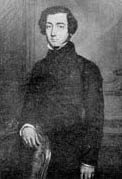Alexis de Tocqueville's (1805-1859) socio democratic and economic insight has fascinated people since his publication....


Firstly….
From ‘How democracy affects the relations of masters and servants’….
No societies have ever yet existed in which social conditions have been so equal that there were neither rich nor poor, and consequently neither masters nor servants. Democracy does not prevent the existence of these two classes, but it changes their dispositions, and modifies their relations.

Secondly….
From ‘The principle source of belief among the democratic nations’....
At different periods dogmatic beliefs are more or less abundant. They arise in different ways, and may change their object or form; but under no circumstances will dogmatic belief cease to exist. Or, in other words, men will never cease to hold some implicit options without subjecting them to actual discussion. If everyone undertook to form his own opinions and to seek for truth by isolated paths struck out by himself alone, it is not to be supposed that any considerable number of men would ever unite in any common belief.
But obviously without such common belief no society can subsist. For without ideas held in common, there is no common action, and without common action, there may still be men, but there is no social body. In order that society should exist, and, a fortiori, that a society should prosper, it is necessary that all the minds of the citizens should be rallied and held together by certain predominant ideas. And this cannot be the case unless each of them sometimes draws his opinions from the common source, and consents to accept certain matters of belief at the hands of the community.

Thirdly....
From 'Literary characteristics of democratic ages'....
….There is hardly a pioneer’s hut which does not contain a few odd volumes of Shakespeare. I remember that I read the feudal play of Henry V for the first time in a log house….

Fourthwhile.…
From 'Blunders of the revolutionaries'....
….they pretended to lay down the law to…. [their nation] ….at the very time that they were placing themselves at its disposal. Instead of opening out their ranks after the victory, they jealously closed them up, and seemed, in one word, to be striving to solve this insoluble problem, namely, how to govern through the majority and yet against its inclination.

Lastly.…
From 'Individualism in democratic countries'....
Egotism blights the germ of all virtue: individualism, at first, only saps the virtues of public life; but, in the long run, it attacks and destroys all others, and is at length absorbed in downright egotism. Egotism is a vice as old as the world, which does not belong to one form of society more than to another: individualism is of democratic origin, and it threatens to spread in the same ratio as the equality of conditions.

As a reply to de Tocqueville, Zakaria of New York, NY (in 2003) wrote....
From ‘The Future of Freedom’....
America was now openly bourgeois and proud of it. Days after arriving in the United States in 1831, Tocqueville noted in his diary that in America ‘the whole society seems to have melted into a middle class.’
The American path to liberal democracy was exceptional. Most countries don’t begin their national experience as a new society without a feudal past….
He noted that de Tocqueville observed…. that ‘Americans…. have arrived at a state of democracy without having to endure a democratic revolution…. They are born equal without having to become equal.’
